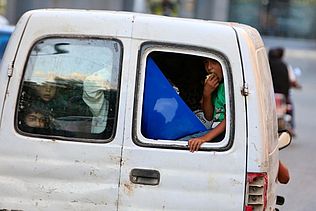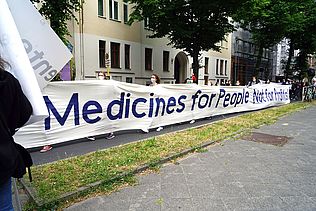medico:Back in October 2020, the governments of South Africa and India submitted a request to the World Trade Organization (WTO) for a globally agreed waiver for patents and other intellectual property rights on Covid-19 medical devices. A compromise proposal is now on the table. What is the PHM's assessment of this possible compromise?
Lauren Paremoer: The now proposed waiver, as we see it, is not really a waiver. The idea for the waiver was to create a sense of legal certainty for transferring technology, manufacturing and distributing vaccines, therapeutics and diagnostics. Unfortunately, this is no longer reflected in the compromise that was now leaked.
We see two main issues with this new text: one, it claims that South Africa, India, the US and the EU have agreed on the text. But this isn't necessarily clear as at least India and South Africa have not publicly endorsed the text since it was leaked. This could be because it's not including much of what India and South Africa had originally demanded. In fact, the leaked text is a combination of the EU position of using existing flexibilities with some changes on export restrictions and the US position which is limited to vaccines. This leaves us wondering how much consensus there actually is.
The other issue is related to what the text promises. It is only limited to vaccines, though the initial proposal by South Africa and India included a lot more. You also need testing, for example, to know where the pandemic is spreading or what the genetic profile of the virus is so that you can check mutations. Testing is really important, particularly to contain transmission in places where health care is difficult to access. Another aspect is that with new treatments available, you have to start treatment within five days for it to be effective. So, you can't treat if you haven't gotten tested. Testing, vaccinating, and treating are interrelated, but the current draft is limited to only one part of the problem, vaccinating.
Could you elaborate a bit more on how it deviates from the initial proposal issued by South Africa and India and why this is so problematic?
It's a limitation of the original proposal because it only applies to patents. Other intellectual property that is needed to transfer technology to scale up manufacturing is not included. There is also uncertainty about the amount of time for which the agreement will be applicable. There is uncertainty around who counts as a developing country at the World Trade Organization. Who will end up actually benefitting from the waiver? There is quite a big concern around this promise that in six months' time the question of diagnostics and therapeutics will be revisited. It's taken this long to get a really bad position on the table. We also look at diagnostics and therapeutics. Will we see a similar text in six months? If this does happen in six months, the text that may be proposed for diagnostics and therapeutics may have many similar problems, and that would be an issue.
A bigger, more systemic problem is if this becomes the precedent for all future pandemics. Many states and social movements have called for a provision that the Trade Related Aspects of Intellectual Property Rights (TRIPS) is automatically suspended during public health emergencies of international concern which would be a much broader intervention than this.
What does the waiver mean for poorer countries?
It would be really problematic for the African continent if this non-waiver gets institutionalized as the baseline response in global governance. We know that in the Doha Declaration of 2001, there was a big struggle to obtain that concession which is an explicit exception for medical emergencies. Both the Doha Declaration exception and the TRIPS flexibility are generally difficult to use. This current text basically endorses the existing TRIPS flexibilities. This is really bad for the African continent.
South Africa, which has a strong legal system, has not yet reformed its domestic patent laws to make full use of TRIPS flexibilities. For example, even if things change at the global level, there are also these national level complexities in terms of needing domestic reforms to implement flexibilities. And then also, some countries are in regional blocks and they have regional arrangements on regulating intellectual property rights (IPR) which again adds another layer of complexity.
So really, a waiver that automatically suspended all of these regulations presumably would be easier to implement than one that actually adds another layer of qualification in terms of who is eligible, to do what, under which circumstances. Also, an intervention like the original waiver request, which proposes waiving patents but also copyright, industrial designs, and trade secrets ensures these other aspects of IPR don’t become impediments - which would be the case under the current text.
Is it as groundbreaking as it is claimed that Moderna is giving away its patent on vaccines for certain countries?
What we've seen is that Moderna is taking out patents but they are not enforcing it during the pandemic. It's a discretionary decision as to when they start enforcing patents because it's up to them to decide when the pandemic is over. In South Africa, Moderna is taking out three patents that are very broadly written. It's a problem because South Africa at the WHO mRNA vaccine hub is trying to replicate the Moderna vaccine.
The fact that the government has awarded these three patents for Moderna means that if they choose to enforce it in South Africa, it might make it difficult for the vaccine hub to move into a commercial phase. As I understand it, while they are in the research and development phase, they are not necessarily breaching any patent rights. But once they move into a commercialisation phase, they could be sued. That's a big problem because the objective is to develop vaccines for the market.
Could you explain in a little more detail why we talk about one vaccine but several patents?
One vaccine has patents on different sub-components and it can be a patent not only on the substance but on the process. So for example where you have a patent on methods to produce an mRNA vaccine, that's something that could apply to any mRNA vaccine. If someone develops a TB vaccine or an HIV vaccine using that mRNA technology, it could become legal conflict. If that kind of foundational technology is patented, Global South countries would be severely restricted in developing vaccines for a whole range of diseases and conditions.
The atmosphere during the EU-AU summit in February was quite tense and it seems that African governments are increasingly frustrated about structural inequalities being responded to with the charity approach.
African states have definitely been let down by COVAX, the initiative at the World Health Organization based on the equitable resale of voluntary vaccine donations from states, the pharmaceutical industry, and philanthropic foundations. That all countries should purchase from COVAX for at least 20 percent of the population was partially circumvented by middle-income countries to reach bilateral agreements for fear of having to stand at the end of the queue.
So, there definitely is a sense of disillusionment in attempts to forge solidarity through these multilateral mechanisms in the sense that COVAX in particular has failed. In light of that, perhaps this is why there has been so much emphasis on technology transfer.
What’s your perspective on vaccine inequality within the continent and within South Africa?
South Africa made a bilateral deal relatively early on to get vaccines from Pfizer and Johnson & Johnson. Much of the money for those deals came from domestic sources. In relation to other African countries, we were lucky to do that. In that sense, South Africa is guilty of bypassing COVAX because people could see that COVAX might be under pressure to buy vaccines when all the stock had already been taken up by these bilateral deals. We procured enough vaccines quite early on in the pandemic so that about 2/3 of the population could be vaccinated.
In South Africa the vaccine is free. You don’t have to pay for it. But the problem is that people wanting to go for their vaccine will have to spend money on transport or need internet access to find out where vaccine sites are open. There are also fewer vaccine sites in poorer communities. There is definitely vaccine inequality along class and racial lines even though the services are formally free.
Currently, people increasingly speak about the pandemic becoming endemic. Would you say we’re slowly seeing a return to 'normality'?
There simply is no return to normal as long as people don't have equitable access to all the different technologies, vaccines, diagnostics and therapeutics. Yes, highly vaccinated populations do have some level of defence against Covid-19 which means people clear the virus from their bodies faster and there is less chance of mutation. However, where the virus is endemic in poorly vaccinated populations, and also in immunocompromised populations, the people will have a much tougher time clearing the virus and there's more risk of mutations. What it means to live with the virus in places where people are not vaccinated and don't have strong defences against it, is very different to what it means for those populations that do have strong defences against it.
As long as vaccine inequality persists, there is a high chance of mutation, which again is a global problem. It's an illusion to think that vaccination at the national or even regional level is a sufficient level of protection against another worst-case scenario.
More fundamentally, there were a lot of things that were not normal pre-Covid – for example, wealth inequalities, systemic racism, and the catastrophes brought about by climate change. So it’s problematic that the conversation on “building back better” which we had during the height of the pandemic is now being entirely ignored. Now, it is increasingly replaced with a conversation about “returning to normal” as if the pre-pandemic period was not deeply problematic in terms of health equity and social justice more broadly.
Interview: Anna Pagel and Julia Manek




